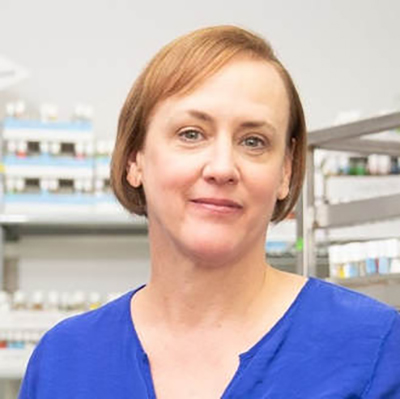Dr. Julie K. Andersen
Julie K. Andersen, Ph.D. is Professor at the Buck Institute for Research on Aging. She joined the Buck Institute in 2000 and was promoted to professor in 2005.
The Andersen Lab concentrates on understanding the underlying age-related processes that drive neurodegenerative diseases like Parkinson’s. Currently concentrating on understanding the underlying age-related processes driving neurodegenerative diseases in order to identify novel therapeutics that slow or prevent them from occurring. These include small molecules that boost the cell’s own ability to remove damaged proteins and other cellular components through a process called autophagy or those capable of removing cells which can inflict damage on healthy neighbors via a process called cellular senescence.
The lab collaborates with other Buck researchers in order to understand the mechanisms involved and to screen and test novel compounds in various preclinical models of disease, including human induced pluripotent stem cells (iPSCs), C. elegans, and mice.
Prior to her tenure at Buck Institute, Julie was a faculty member at the University of Southern California, joining in 1993 as Assistant Professor where she held the Paul F. Glenn Chair in Molecular and Cellular Gerontology. She was promoted to Associate Professor in 1999. She earned her doctorate from the Department of Biological Chemistry, UCLA School of Medicine. She conducted her post-doctoral training in the laboratory of Dr. Xandra Breakefield in the Neurogenetics Unit at Massachusetts General Hospital East in the Department of Neurology, Harvard Medical School.
She will be a featured speaker at the Undoing Aging Conference on 2019 in Berlin, Germany. Undoing Aging 2019 is not only open to the scientific community but also welcomes all interested members of the broader rejuvenation movement.
Julie has published more than 170 scientific papers and holds three patents. She has been recognized for her research with a Parkinson’s Pioneer Award from the National Parkinson’s Foundation, a Glenn Award for Research in Biological Mechanisms of Aging, and a senior scholarship from the Ellison Medical Foundation. She was elected a fellow of the Society for Free Radicals in Biology and Medicine in 2013.
She currently serves on the scientific advisory board of the University of Pittsburgh Medical Center’s Biology of Aging Program, on the editorial board of e-Neuro (Journal of Neuroscience e-journal), as a member of the Brookdale Institute on Aging, and as a council member for the Society of Neurotoxicity. She has extensive experience working with both biotech companies and medical foundations, including Roche, the Michael J. Fox Foundation, the National Parkinson’s Disease Foundation, and the American Parkinson’s Disease Foundation.
Her scientific papers include the following: Sembragiline: A Novel, Selective Monoamine Oxidase Type B inhibitor for the Treatment of Alzheimer’s Disease, Regulation of ATP13A2 via PHD2-HIF1α signaling is critical for cellular iron homeostasis: implications for Parkinson’s disease, Environmental stress, ageing and glial cell senescence: a novel mechanistic link to Parkinson’s disease?, Iron elevations in the aging Parkinsonian brain: a consequence of impaired iron homeostasis?, and Detrimental effects of oxidative losses in parkin activity in a model of sporadic Parkinson’s disease are attenuated by restoration of PGC1alpha.
Read the Tomorrow Edition 2018 March Interview with Julie.Julie welcomes media inquiries on the following subjects: Parkinson’s disease, genetic and environmental risk factors, and therapeutics.
“My greatest hope is that our work here at the Buck will allow us to diagnose Parkinson’s at the earliest possible stage, so treatment can begin before the disease has a chance to progress. That would free patients to live fulfilling lives without major disability.”
You can follow Julie on LinkedIn and ResearchGate.
